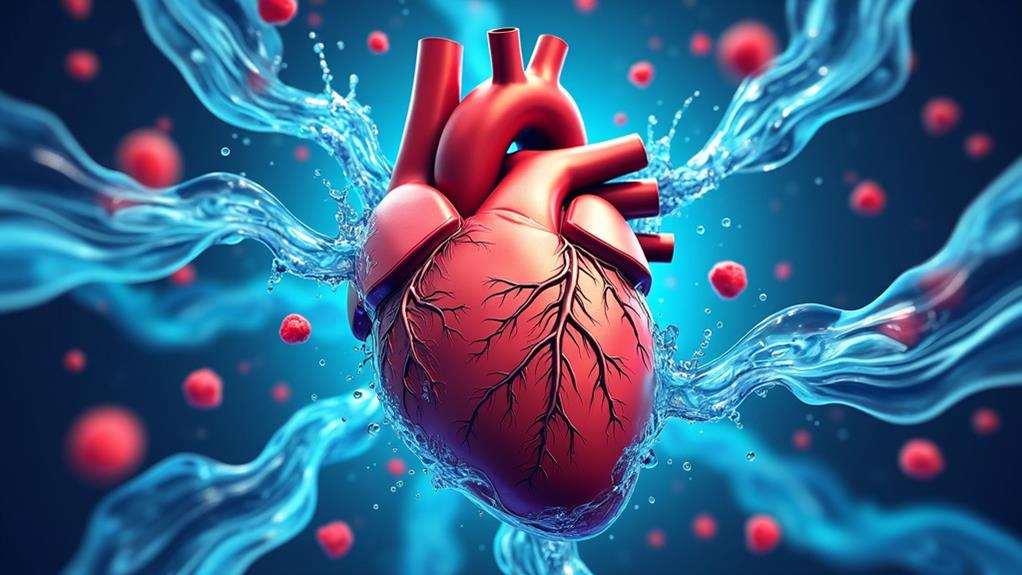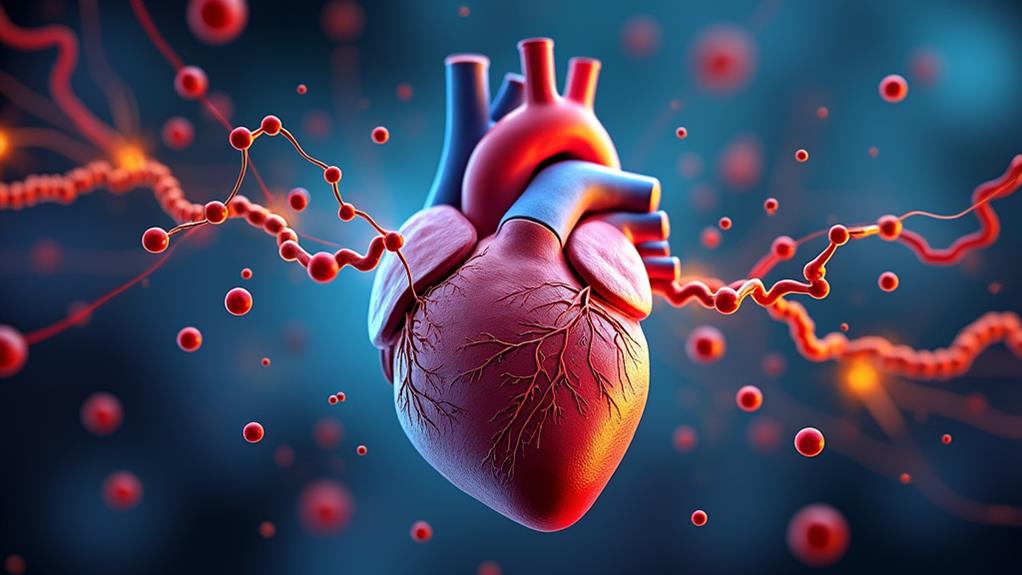
Your heart rate may increase on the ketogenic diet due to dehydration, electrolyte imbalances, and metabolic changes. The body initially loses water weight and essential electrolytes as it shifts from glucose to ketones, which can strain your heart. Low levels of potassium and magnesium, common in low-carb diets, can lead to heart palpitations. To manage these changes, guarantee adequate hydration and consider incorporating electrolyte-rich foods like avocados and nuts. Supplementing with electrolytes can also help balance heart rate fluctuations. Monitoring your hydration levels and nutrient intake is vital during this dietary shift to maintain cardiovascular health. Discover key strategies to optimize your keto experience.
Key Takeaways
- Dehydration and electrolyte imbalances when starting keto can temporarily raise heart rate.
- Transition to ketosis causes metabolic shifts that may increase heart rate as the body adapts.
- Low potassium and magnesium levels on keto can lead to heart palpitations and increased pulse.
- Adequate hydration supports electrolyte balance, preventing dehydration-related heart rate increases.
- Incorporating potassium and magnesium-rich foods helps stabilize heart rate during keto adaptation.
Understanding Heart Rate Changes
When starting on a ketogenic diet, understanding the physiological changes in heart rate is essential for effective adaptation and health maintenance. This diet shift can initially lead to a higher heart rate due to dehydration and electrolyte imbalances.
As the body shifts from glucose to ketones for energy, it experiences metabolic adaptation, which can influence heart rate variability. The depletion of glycogen stores results in fluid loss, contributing to dehydration, and a reduced intake of sodium further exacerbates this condition. Consequently, these factors can increase heart workload, leading to an increased pulse rate.
Additionally, low-carb diets may lack sufficient potassium and magnesium, essential electrolytes for maintaining normal heart rhythm. Their deficiency can disrupt cardiac function and raise heart rate.
The increased protein and fat intake typical of ketogenic diets necessitate more water for digestion, and inadequate hydration can further strain the cardiovascular system.
To mitigate these effects, it is advisable to monitor and adjust electrolyte intake, focusing on sodium, potassium, and magnesium. Ensuring adequate hydration and electrolyte balance can support heart rate variability and promote a smoother metabolic adaptation.
This proactive approach helps maintain cardiovascular health during the initial stages of the ketogenic diet.
Effects of Ketosis on Heart
The effects of ketosis on the heart are particularly significant and warrant close attention, particularly during the initial stages of a ketogenic diet.
As the body undergoes keto adaptation, it experiences a metabolic shift from using glucose to utilizing ketones for energy. This change can temporarily raise heart rate as the cardiovascular system adjusts to the reduced carbohydrate intake and resultant low glycogen stores.
Such a metabolic shift can lead to dehydration and electrolyte imbalances, which impact fluid retention and consequently increase heart workload. Recognizing dehydration symptoms such as dark urine, dizziness, and dry mouth is vital during this phase.
Dehydration and low glycogen contribute to fluid loss, intensifying the heart's efforts to maintain adequate circulation, thereby raising the pulse rate. Additionally, electrolyte deficiencies, particularly in important minerals like potassium and magnesium, can exacerbate heart palpitations and an increased heart rate during ketosis.
These deficiencies may further complicate the heart's adaptation processes as it compensates for these imbalances. To manage these effects and support cardiovascular health, it is important to monitor hydration closely and guarantee adequate intake of electrolytes.
Incorporating foods rich in potassium and magnesium, or considering supplementation, can mitigate the heightened stress on the heart during the keto adaptation phase.
Role of Electrolyte Imbalance
As the heart adjusts to the metabolic changes induced by a ketogenic diet, addressing the role of electrolyte imbalance becomes essential. Electrolyte imbalances, particularly diminished potassium and magnesium levels, are common on a keto diet due to reduced carbohydrate intake and the resultant fluid loss.
This fluid loss often arises from decreased glycogen stores, which release water, leading to rapid depletion of essential minerals. Such deficiencies can contribute considerably to an increased heart rate and symptoms like heart palpitations, muscle cramps, and fatigue. To help manage these symptoms, individuals may also experience muscle soreness and headaches as part of the adaptation phase known as keto flu.
To counteract these imbalances, identifying appropriate electrolyte sources is imperative. Incorporating potassium-rich foods such as avocados and leafy greens, along with magnesium sources like nuts and seeds, can help maintain essential mineral levels.
Additionally, tailored hydration strategies are essential for sustaining electrolyte equilibrium. Ensuring adequate water intake aids in mitigating the symptoms linked to dehydration, which often exacerbate the effects of electrolyte deficiencies.
Supplementation with electrolytes, especially potassium and magnesium, can also be a practical solution to stabilize heart rate fluctuations. By prioritizing these strategies, individuals on a ketogenic diet can support cardiovascular health and mitigate the adverse effects of electrolyte imbalances on heart rate.
Importance of Hydration
Adequate hydration is essential on the ketogenic diet to support electrolyte balance, which is vital for maintaining a stable heart rate. Staying hydrated not only helps alleviate symptoms like muscle cramps and headaches but also guarantees the body adjusts more comfortably during the shift to ketosis.
Dehydration can exacerbate symptoms such as an increased heart rate by disrupting the balance of key electrolytes like sodium, potassium, and magnesium.
Furthermore, proper hydration enhances nutrient absorption and digestion, ensuring that the body efficiently utilizes the increased fat and protein intake characteristic of this diet.
Maintaining Electrolyte Balance
Initiating a ketogenic diet necessitates a proactive approach to maintaining electrolyte balance, particularly due to its impact on hydration. The reduction in carbohydrate intake results in diminished glycogen stores, leading to significant fluid loss.
This underscores the importance of replenishing electrolytes—key elements in regulating heart rate. Electrolyte sources such as sodium, potassium, and magnesium should be prioritized to mitigate potential imbalances that could contribute to increased pulse rates.
Practical hydration strategies are essential to address the body's increased water requirement for metabolizing fats and proteins.
To effectively maintain electrolyte balance, consider the following recommendations:
- Increase salt intake: Sodium is vital for retaining water and preventing dehydration.
- Consume nutrient-rich vegetables: Vegetables like spinach and avocados are excellent potassium sources.
- Monitor hydration levels: Regular checks can help guarantee electrolyte stability and heart rate regulation.
- Incorporate magnesium-rich foods: Nuts, seeds, and leafy greens can aid in preventing deficiencies.
- Stay attentive to fluid intake: Aim for adequate water consumption to support metabolic processes.
Preventing Dehydration Symptoms
Maintaining proper hydration is a key aspect when adopting a ketogenic diet, directly linked to the body's electrolyte balance. A low carbohydrate intake reduces glycogen stores, which subsequently decreases water retention. This necessitates effective hydration strategies to prevent dehydration symptoms such as headaches and fatigue.
Increased fat and protein consumption further underscores the need for adequate fluid intake, as these macronutrients require more water for digestion. To address these challenges, individuals on a ketogenic diet should aim to consume at least 2 to 3 liters of water daily. However, fluid requirements may vary depending on personal activity levels and environmental conditions.
Incorporating diverse fluid sources, including herbal teas and broths, can aid in maintaining hydration while providing essential electrolytes. Electrolyte loss, particularly of potassium and magnesium, can lead to heart palpitations and other health issues.
As a result, maintaining hydration not only supports blood volume but also promotes overall cardiovascular health, reducing the risk of a raised heart rate due to dehydration. Regularly monitoring hydration status and adjusting fluid intake as necessary guarantees that the body's electrolyte balance is sustained, thus preventing adverse symptoms associated with dehydration on a ketogenic diet.
Enhancing Nutrient Absorption
Effective hydration plays a vital role in enhancing nutrient absorption on a ketogenic diet, greatly impacting overall health and heart rate regulation. Proper hydration helps maintain electrolyte balance—essential for heart rate stability—by facilitating the absorption of essential minerals such as potassium and magnesium.
These nutrients are important for maintaining ideal heart function and preventing palpitations, a common concern for individuals following a low-carbohydrate regimen.
On a ketogenic diet, the reduction in carbohydrate intake depletes glycogen stores, leading to rapid fluid loss. This necessitates increased water consumption to support hydration and nutrient timing. Staying well-hydrated not only aids in nutrient absorption but also promotes digestive health by ensuring efficient breakdown and utilization of fats and proteins.
To enhance nutrient absorption and heart health, consider the following practical advice:
- Increase water intake to counterbalance glycogen-related fluid loss.
- Monitor electrolyte levels, focusing on magnesium and potassium.
- Adjust hydration based on physical activity and dietary changes.
- Prioritize nutrient timing by consuming hydrating foods and beverages.
- Pay attention to digestive health by maintaining a balanced intake of fiber and fluids.
Glycogen and Fluid Dynamics

Understanding the dynamics of glycogen and fluid retention is essential for those following a ketogenic diet, as the low carbohydrate intake leads to a significant reduction in glycogen stores within the liver. This reduction in glycogen levels is particularly beneficial for managing type 2 diabetes, as it contributes to better glycemic control.
Glycogen storage typically involves binding with water—about 3-4 grams of water per gram of glycogen. Consequently, when glycogen levels plummet due to carbohydrate restriction, a corresponding drop in fluid retention occurs. This process can result in rapid fluid loss, leading to a significant decrease in body weight initially experienced by many keto dieters.
However, this fluid reduction has potential implications for cardiovascular health, as it may lead to electrolyte imbalances, especially in potassium and magnesium levels, which are critical for maintaining a stable heart rate. Such imbalances can increase heart workload and raise pulse rates, posing challenges for individuals with existing heart conditions. Symptoms like dehydration can exacerbate these effects, underscoring the importance of maintaining hydration.
Practical advice for those on a ketogenic diet includes monitoring fluid intake and considering supplementation to maintain electrolyte balance. Ensuring adequate hydration and a balanced intake of essential minerals can help mitigate these effects, contributing to a healthier, more stable heart rhythm.
Nutrient Deficiencies in Keto
As individuals on a ketogenic diet navigate the challenges of electrolyte imbalances, attention must also be given to potential nutrient deficiencies that may arise.
These deficiencies, particularly in potassium and magnesium, are primarily attributed to the limited food variety inherent in the diet. The reduced intake of fruits and starchy vegetables, which serve as key nutrient sources, can lead to inadequate levels of these essential electrolytes. Such deficiencies may contribute to symptoms like increased heart rate and fatigue.
Additionally, deficiencies in essential nutrients like iodine, selenium, and zinc can also impact thyroid function, which could further exacerbate symptoms. To mitigate these risks, dietary adjustments and supplementation can be beneficial. Incorporating a variety of low-carb vegetables and nuts can improve nutrient intake.
Additionally, regular monitoring of nutrient levels is vital to address any deficiencies promptly.
Practical steps to take into account include:
- Supplementation: Potassium and magnesium supplements can help maintain ideal levels.
- Varied Diet: Include leafy greens, avocados, and seeds for diverse nutrient sources.
- Fiber Intake: Enhance gut health by focusing on high-fiber, low-carb options.
- Hydration: Guarantee adequate water intake to support electrolyte balance.
- Regular Check-Ups: Monitoring nutrient levels can preemptively address deficiencies.
Impact of Vitamin B1

Vitamin B1, or thiamine, is essential for energy metabolism and nerve function, directly influencing heart health.
During shifts to the ketogenic diet, low thiamine levels can manifest as an increased pulse rate, highlighting the importance of monitoring this nutrient.
Additionally, protein synthesis plays a key role in maintaining muscle health and energy levels, which can also impact heart rate.
To mitigate these symptoms, individuals may consider vitamin B1 supplements or adding thiamine-rich foods such as nutritional yeast to their diet, ensuring balanced nutrient intake and supporting cardiovascular stability.
Thiamine's Role in Heart
Thiamine, more commonly known as vitamin B1, plays a pivotal role in maintaining proper heart function by supporting energy metabolism and nerve activity. It is essential for converting nutrients into energy and guaranteeing efficient nerve signaling, which impacts heart rate regulation.
In the context of a ketogenic diet, thiamine absorption becomes particularly important due to dietary changes that might limit thiamine sources. Foods like whole grains, meat, and fish are excellent thiamine sources, yet they might be under-consumed when following keto guidelines.
Low thiamine levels can lead to an increased heart rate and palpitations. Consequently, understanding thiamine's role in heart health involves acknowledging its effect on energy production and nerve stability. Supplementation or consuming thiamine-rich foods such as nutritional yeast can support cardiovascular health.
Consider monitoring nutrient intake to maintain heart health:
- Guarantee a consistent intake of thiamine through diverse food sources.
- Pay attention to thiamine absorption, which can be affected by alcohol consumption and certain medications.
- Recognize signs of low thiamine, such as fatigue and weakness.
- Consult with a healthcare provider for personalized advice when starting a keto diet.
- Monitor heart rate changes and address any concerns promptly.
B1 Deficiency Symptoms
Recognizing the symptoms of B1 deficiency is essential, particularly for those adhering to a ketogenic diet. Vitamin B1, or thiamine, plays a significant role in energy metabolism and nerve function. A deficiency in this fundamental nutrient can manifest through symptoms such as increased heart rate, fatigue, and irritability. The risk of deficiency heightens with a low carbohydrate intake, often seen in ketogenic diets, due to reduced consumption of thiamine-rich foods.
To mitigate these risks, monitoring thiamine levels and considering B1 supplementation or thiamine sources like nutritional yeast can be beneficial. These steps help in alleviating symptoms and maintaining cardiovascular health. Awareness of these symptoms is imperative for timely intervention.
| Symptom | Impact on Body | Recommended Action |
|---|---|---|
| Increased Heart Rate | May signal cardiovascular stress | Consider B1 supplementation |
| Fatigue | Affects daily energy levels | Increase thiamine sources |
| Irritability | Impacts mental well-being | Monitor nutrient intake |
| Confusion | Affects cognitive function | Evaluate dietary adjustments |
| Muscle Weakness | Reduces physical performance | Supplement with vitamin B1 |
Managing Heart Palpitations
Managing heart palpitations on the keto diet, often necessary during the initial shift phase, focuses on addressing dehydration and electrolyte imbalance. These palpitations can be triggered by the body's changeover to ketosis, often exacerbated by low salt levels and insufficient hydration.
To mitigate these palpitations, dietary adjustments are essential. Increasing water intake and guaranteeing moderate salt consumption can help maintain the necessary electrolyte balance, thereby reducing the heart's workload.
It's important to note that most heart palpitations are temporary, typically resolving within a week or two as the body adapts to the new diet. Additionally, hydration goals suggest aiming for at least 2.5 liters of fluids daily, which can further assist in maintaining electrolyte balance and overall heart health.
To effectively manage heart palpitations on the keto diet, consider the following practical strategies:
- Increase water intake to prevent dehydration, which can exacerbate palpitations.
- Incorporate moderate salt into meals to maintain electrolyte balance, essential for heart health.
- Monitor symptoms closely; if palpitations persist, consult a healthcare professional.
- Be aware of other potential health conditions like diabetes or hypertension that may require medication adjustments.
- Regularly check your electrolyte levels to guarantee they are within a healthy range, helping to prevent cardiac stress.
Implementing these strategies can help manage palpitations effectively, facilitating a safer shift to the keto lifestyle.
Stress Hormones and Heart Rate

Adapting to a ketogenic diet can increase stress hormones like cortisol and adrenaline, leading to heightened heart rates as the body adjusts to reduced carbohydrate intake.
These hormones activate the sympathetic nervous system, which can further stimulate heart rate.
Additionally, low carbohydrate intake on the keto diet can raise cortisol levels, exacerbating stress-related weight retention and metabolic issues, while complicating thyroid function and weight management.
To manage these stress responses, individuals should focus on maintaining proper hydration and electrolyte balance, and consider incorporating relaxation techniques to help stabilize heart rate fluctuations.
Impact of Cortisol Levels
Understanding the physiological interplay between cortisol levels and heart rate is essential, particularly during dietary changes such as adopting a ketogenic diet. Raised cortisol levels, often triggered by dietary shifts and stress, can provoke an increased heart rate. The body's natural response to perceived threats is to pump blood faster, a reaction that may be heightened during the keto diet's adjustment period.
Recognizing this, cortisol management becomes vital in maintaining cardiovascular health. Stress reduction strategies are important in mitigating the effects of heightened cortisol. Chronic stress can sustain high cortisol levels, posing risks of long-term cardiovascular complications and raised resting heart rates.
The ketogenic diet's initial phase can amplify stress, leading to cortisol spikes that affect heart rate variability. To counteract these effects, consider integrating the following practices:
- Mindfulness meditation: Reduces stress and lowers cortisol levels.
- Regular exercise: Enhances mood and regulates stress hormones.
- Adequate hydration: Supports overall bodily function and stress response.
- Consistent sleep patterns: Improves hormonal balance and stress management.
- Balanced electrolyte intake: Essential for heart function and stability.
Implementing these strategies can help manage cortisol effectively, promoting a healthier shift into the ketogenic lifestyle.
Adrenaline and Heart Rate
As the body adjusts to a ketogenic diet, the interplay between dietary changes and the body's stress responses becomes increasingly apparent. A critical component of this adjustment is the release of adrenaline, a stress hormone that can influence heart rate.
During the initial phases of changing to ketosis, the body may experience an increased adrenaline release as it adapts to utilizing fat as its primary energy source. This hormonal surge can stimulate the heart, resulting in an increased heart rate and potentially causing palpitations or a racing heartbeat.
The heightened adrenaline levels increase blood flow to essential organs, a necessary adaptation during this dietary change. However, this can place temporary stress on the cardiovascular system. While these changes in heart rate are typically transient, there is concern regarding chronic increase of adrenaline. Prolonged exposure to heightened adrenaline may pose risks for long-term cardiovascular health if not addressed.
Understanding these physiological responses is crucial for those on a ketogenic diet. Monitoring heart rate and recognizing the signs of excessive adrenaline release can aid in heart adaptation.
Practical steps, such as maintaining hydration and ensuring proper electrolyte balance, can support cardiovascular function during this dietary shift.
Managing Stress Responses
Maneuvering the stress responses associated with the ketogenic diet requires a strategic approach to managing stress hormones like cortisol and adrenaline, which can raise heart rate during the initial alteration period.
The shift to ketosis can cause temporary fluctuations in heart rate, as the body releases these stress hormones in response to dietary changes. Understanding and addressing these physiological reactions is essential for maintaining cardiovascular health during this process.
Stress management plays a significant role in mitigating these effects. Incorporating relaxation techniques can help regulate heart rate by reducing stress hormone levels. Techniques such as deep breathing and meditation have been shown to lower cortisol, thereby stabilizing heart rate.
It's important to monitor stress levels and heart rate to guarantee they do not remain chronically heightened, as this might necessitate dietary adjustments or further stress management interventions.
Consider the following practical approaches:
- Deep Breathing: Practice slow, controlled breaths to lower cortisol levels.
- Meditation: Engage in mindfulness or guided meditation sessions to promote relaxation.
- Regular Exercise: Incorporate moderate physical activity to reduce stress.
- Adequate Sleep: Confirm sufficient rest to support stress management.
- Balanced Diet: Maintain nutritional balance to support overall well-being.
Electrolyte Supplementation Tips
Managing electrolyte supplementation on a ketogenic diet is vital due to the potential for deficiencies in key minerals like potassium, magnesium, and sodium. These deficiencies arise from reduced carbohydrate intake and increased fluid loss.
Key electrolyte sources include vegetables, which can help replenish potassium levels. Incorporating a variety of leafy greens, nuts, and seeds can aid in maintaining adequate magnesium levels. Including electrolyte supplements in your routine can further guarantee proper hydration and prevent symptoms like muscle cramps and headaches associated with the keto flu.
Establishing a supplementation schedule is significant; for instance, a daily intake of 3000-5000 mg of potassium is often recommended to maintain electrolyte balance and support heart health.
Sodium intake should also be carefully monitored. Experts suggest increasing sodium intake to 3000-5000 mg per day, particularly during the initial phase of the ketogenic diet. This adjustment can prevent dehydration and support stable blood pressure levels.
It is also advisable to take into account thiamine (vitamin B1) supplementation, as low levels of this vitamin may contribute to an increased pulse rate. Adding nutritional yeast or a B1 supplement can assist in alleviating associated symptoms.
Monitoring Nutrient Levels
Electrolyte supplementation plays a significant role in managing a ketogenic diet, but it is equally important to focus on monitoring nutrient levels to secure overall well-being.
A ketogenic diet can lead to deficiencies in essential vitamins and minerals, especially potassium and magnesium, which may raise heart rate and pose other health concerns.
For instance, certain nuts and seeds like cashews and peanuts contain higher carb content and should be consumed in moderation to avoid disrupting ketosis and nutrient balance.
Effective nutrient tracking is critical to confirm that these essential nutrients are maintained at ideal levels.
To manage nutrient levels effectively, consider the following practical steps:
- Nutrient Tracking: Regularly monitor your intake of key vitamins and minerals to avoid deficiencies.
- Vitamin Sources: Incorporate foods rich in essential nutrients, like leafy greens for magnesium and avocados for potassium.
- Thiamine Monitoring: Confirm adequate Vitamin B1 intake, as it supports energy metabolism and prevents heart rate increase.
- Electrolyte Checks: Regularly assess electrolyte levels, especially potassium and magnesium, to maintain stable heart function.
- Dietary Adjustments: Make necessary dietary changes or take supplements to address any nutrient gaps identified.
Consulting Health Professionals
When experiencing persistent elevation in heart rate on a ketogenic diet, it is vital to consult healthcare professionals to assess potential underlying causes and address nutrient deficiencies. Health assessments conducted by medical providers can identify if nutrient imbalances, particularly electrolytes like potassium and magnesium, are contributing factors.
These minerals are essential for heart function, and their levels can be affected during dietary changes such as the adoption of a ketogenic diet. It's also important to take into account that insulin resistance is a common issue among women with PCOS, potentially influencing heart rate changes when adopting a new diet. This makes medical consultation even more significant for women with PCOS on a keto diet.
In addition to health assessments, dietary consultations with nutritionists or dietitians experienced in ketogenic dietary practices can be invaluable. These experts can offer tailored advice to guarantee a balanced intake of nutrients, minimizing side effects such as increased heart rate.
They can also provide guidance on how to maintain electrolyte levels through diet, which can be pivotal in managing cardiovascular health.
For individuals with pre-existing conditions like diabetes or hypertension, a healthcare provider might suggest adjustments to medication regimens if heart rate issues arise. This personalized approach guarantees that any medical interventions align with the individual's overall health status.
Regular check-ups are advised to monitor the heart's response to the diet and to address any emerging risks associated with long-term adherence to the ketogenic lifestyle.
Adapting to Keto Safely

Changing safely to a ketogenic diet requires a methodical approach to minimize adverse effects such as increased heart rate and fatigue. Implementing effective keto adaptation strategies can greatly ease this change.
Gradual adjustment tips are essential for guaranteeing your body adapts comfortably without overwhelming symptoms. An incremental approach can help mitigate common issues like dehydration and electrolyte imbalance, which are often associated with increased heart rate on a keto diet.
To facilitate a smooth adaptation, consider the following practical tips:
- Hydration: Maintain adequate fluid intake to counteract dehydration caused by reduced glycogen stores.
- Electrolyte Balance: Monitor and confirm sufficient intake of essential electrolytes, especially potassium and magnesium, to stabilize heart rate fluctuations.
- Vitamin B1 Supplementation: Consider supplementing with thiamine to help regulate heart rate and manage pulse elevation.
- Professional Guidance: Regularly consult a healthcare professional or keto expert for personalized advice and to address any concerns during your change.
- Gradual Dietary Changes: Slowly reduce carbohydrate intake and increase healthy fats to allow your body to adjust without shock.
Frequently Asked Questions
Is Ketosis Hard on the Heart?
The effects of ketosis on heart health are not fully understood. While there may be potential benefits, such as improved cholesterol levels, concerns about dehydration and electrolyte imbalances necessitate careful monitoring and consultation with healthcare professionals, especially for those with existing conditions.
Why Does My Heart Rate Increase When I Eat Carbs?
The increase in heart rate upon consuming carbohydrates may be attributed to carb sensitivity, which triggers a significant metabolic response. This response includes heightened insulin and cortisol levels, leading to increased heart rate as the body processes glucose.
What Causes Heart Palpitations on Keto Diet?
Heart palpitations on the keto diet can result from electrolyte imbalance and increased stress response. Dehydration, electrolyte deficiencies, and heightened stress hormones during ketosis shift may contribute to these symptoms. Monitoring fluid, potassium, and magnesium intake is essential.
Does Ketosis Make You Feel High?
Ketosis may induce a heightened sense of energy and focus, potentially akin to a mild "high." This effect varies among individuals, possibly mitigating keto cravings and stabilizing energy levels as the brain efficiently utilizes ketones.
Conclusion
In summary, the raised heart rate experienced on the keto diet can be attributed to physiological changes associated with ketosis, electrolyte imbalances, and alterations in glycogen and fluid dynamics. Ensuring adequate hydration and electrolyte supplementation is essential in mitigating these effects. Monitoring nutrient levels and consulting healthcare professionals can provide guidance for a safer adaptation to the diet. The keto diet requires careful management to maintain cardiovascular health and prevent adverse symptoms associated with metabolic changes.










No Comments